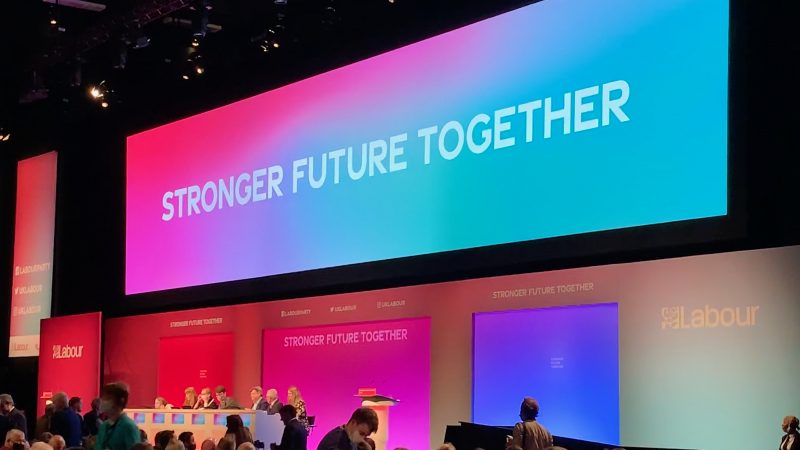
Hello! My name’s James McAsh and I’m doing a conference delegate diary for LabourList this week. I’ve been in the party for almost a decade, and I’ve been a councillor for the past three years, but this is my first conference as a delegate so I’ll be learning as I go.
The first thing I did upon arriving in Brighton was head to my regional briefing at the Hilton. This was mainly about how the party’s labyrinthine procedures work but there was a big focus on Covid safety. Laughter erupted when the packed room of 200 or so delegates were told to maintain social distancing.
Conference itself was opened by chair of the national executive committee (NEC), Margaret Beckett. She almost immediately handed over to Peter Kyle, the local MP for Hove, who gave a jovial introduction to Brighton. He emphasised that the town has more pubs and cafés per person than any other in Britain, and ended with a recommendation to visit a local ice creamery. I wonder what they’d done to get such prime advertising.
The first major item was the report of the conference arrangements committee (CAC). Left groups like Momentum and the Campaign for Labour Party Democracy had been encouraging delegates to “reference back” the conference timetable on the grounds that no provisions had been made for a vote on the appointment of David Evans as general secretary. But this early confrontation was avoided when CAC chair, Harry Donaldson, announced that such a vote had been timetabled after all. Whether this was a last-minute U-turn or the intention all along is not clear. The only other challenge to the CAC was from a Merseyside delegate who asked why “Murdoch’s lying rag, The Sun, is allowed at our conference”. The conference exploded into applause.
The longest speech was from our deputy leader, Angela Rayner. She focused on workers’ rights, praising key workers and celebrating the victory of the Shrewsbury 24. She then announced a series of policies: fair pay agreements to instate sectoral bargaining across the economy, introducing workers rights for all on day one of employment, and ending fire and rehire. I’m a teacher and we lost collective bargaining 30 years ago. The last Labour government did not restore it, so it was good to hear that the next one will. These announcements do not go beyond anything in the 2019 manifesto, though.
The report by general secretary David Evans was full of audience participation, albeit not intentionally. He started by thanking Keir Starmer for his support, only to turn around and discover that Keir had left the stage. He then asked the audience to remember why it was that they had joined the Labour Party. It was presumably a rhetorical question but a group replied nonetheless by chanting “Oh, Jeremy Corbyn!”.
Evans is clearly a divisive figure. When he said his time at Croydon Trades Council had taught him about “solidarity”, there was laughter. But when his speech ended and he called for delegates to vote in favour of his appointment, he received a small standing ovation. He won the final vote too, with 59% in favour and 41% against. This is a pretty extraordinary result. The appointment is normally just waved through as entirely uncontroversial but this time two fifths of our movement voted against the general secretary, despite there being no other candidate on offer. Hopefully, the result will encourage some quiet reflection on how the party treats its activists and members.
The next section of the day was devoted to awards, reports and speeches from MPs. Then there were two motions from annual women’s conference. Multiple delegates from local parties and unions spoke movingly about misogyny, gender inequality, and violence against women and girls. Both motions were passed overwhelmingly.
The final part of the day was spent on constitutional amendments. The NEC submitted its own amendments, most of which were to centralise power in the NEC or party machinery. It also recommended that the conference vote against all the ideas submitted by Constituency Labour Parties (CLPs). These debates were frustrating. Speakers would make contradictory assertions without explaining why their perspective was correct.
For instance, one CLP rule change asked that the Parliamentary Labour Party (PLP) submit a whip’s report to be approved by conference. The proposer said that the new rule would only relate to disciplinary matters on political questions – like Jeremy Corbyn’s loss of the whip – and not to conduct matters like sexual assault or regarding protected characteristics (e.g. race, gender, etc). But the argument against the proposal – used by every speaker opposing it – was that it was inappropriate for matters like sexual assault to come to conference. Nobody made any attempt to explain why the proposer’s initial claim was wrong. By the end of the debate, delegates would be forgiven for being totally in the dark about what the proposal would actually do.
The day concluded with the announcement of the priority ballot. This decided which topics would be debated throughout the conference. The unions and the CLPs chose ten each. Of the ten CLP topics, seven were recommended by Momentum and four by pro-leadership group Labour to Win. As it stands, the conference looks finely balanced between the party’s competing factions. It will be interesting to see how it turns out tomorrow.




More from LabourList
Nudification apps facilitate digital sexual assault – and they should be banned
Diane Abbott suspended from Labour after defending racism comments
Labour campaign groups join forces to call for reinstatement of MPs